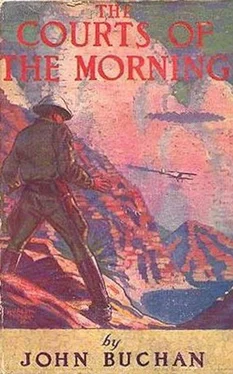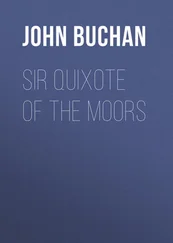John Buchan - The Courts of the Morning
Здесь есть возможность читать онлайн «John Buchan - The Courts of the Morning» — ознакомительный отрывок электронной книги совершенно бесплатно, а после прочтения отрывка купить полную версию. В некоторых случаях можно слушать аудио, скачать через торрент в формате fb2 и присутствует краткое содержание. Жанр: unrecognised, на английском языке. Описание произведения, (предисловие) а так же отзывы посетителей доступны на портале библиотеки ЛибКат.
- Название:The Courts of the Morning
- Автор:
- Жанр:
- Год:неизвестен
- ISBN:нет данных
- Рейтинг книги:3 / 5. Голосов: 1
-
Избранное:Добавить в избранное
- Отзывы:
-
Ваша оценка:
- 60
- 1
- 2
- 3
- 4
- 5
The Courts of the Morning: краткое содержание, описание и аннотация
Предлагаем к чтению аннотацию, описание, краткое содержание или предисловие (зависит от того, что написал сам автор книги «The Courts of the Morning»). Если вы не нашли необходимую информацию о книге — напишите в комментариях, мы постараемся отыскать её.
The Courts of the Morning — читать онлайн ознакомительный отрывок
Ниже представлен текст книги, разбитый по страницам. Система сохранения места последней прочитанной страницы, позволяет с удобством читать онлайн бесплатно книгу «The Courts of the Morning», без необходимости каждый раз заново искать на чём Вы остановились. Поставьте закладку, и сможете в любой момент перейти на страницу, на которой закончили чтение.
Интервал:
Закладка:
A launch from the yacht was even then approaching the landing-stage. Archie could read the name on a sailor's jersey. Two men were landed, one who looked like a steward, and the other a thick-set fellow in an engineer's overalls. They separated at once, and the second of the two walked in Archie's direction. Archie had a bad memory for faces, but there was something in this figure which woke recollection. As they came abreast and their eyes met, both came half unconsciously to a halt. The man seemed to stiffen and his right hand to rise in a salute which he promptly checked. He had a rugged face which might have been hewn out of mahogany, and honest, sullen, blue eyes.
"Hullo," said Archie, "I've seen you before. Now, where on earth...?"
The man gave him no assistance, but stood regarding him in a sulky embarrassment. He sniffed, and in lieu of a handkerchief drew his hand across his nose, and the movement stirred some chord in Archie's memory.
"I've got it. You were with General Hannay. I remember you in that black time before Amiens. Hamilton's your name, isn't it? Corporal Hamilton?"
Like an automaton the figure stiffened. "Sirr, that's my name." Then it relaxed. It was as if Archie's words had recalled it for a moment to a military discipline which it hastened to repudiate.
"Do you remember me?"
"Ay. Ye're Captain Sir Erchibald Roylance." There was no "sirr" this time.
"Well, this is a queer place to foregather. I think the occasion demands a drink. Let's try one of these cafés."
The man seemed unwilling. "I'm a wee bit pressed for time."
"Nonsense, Hamilton, you can spare five minutes. I want to hear how you've been getting on and what landed you here. Hang it, you and I and the General went through some pretty stiff times together. We can't part on this foreign strand with a how-d'ye-do."
Archie led the way to a café in the crescent of old houses which looked a little cleaner than the rest.
"What'll you have, Hamilton?" he asked when they had found a table. "You probably don't fancy the native wine. Bottled beer? Or rum? Or can you face aguardiente, which is the local whisky?"
"I'm a teetotaller. I'll hae a glass o' syrup."
"Well, I'm dashed.... Certainly--I never drink myself in the morning. Now, about yourself? You're a Glasgow man, aren't you? Pretty warm place, Glasgow. Are you and the other soldier-lads keeping the Bolshies in order?"
Hamilton's mahogany face moved convulsively, and his blue eyes wandered embarrassedly to the door.
"My opinions has underwent a change. I'm thinkin' of anither kind of war nowadays. I'm for the prolytawriat."
"The devil you are!" Archie gasped. "So am I, but my opinions are still the same. What exactly do you mean?"
The man's embarrassment increased. "I'm for the proly--prolytawriat. Us worrkers maun stick thegither and brek our chains. I've been fechtin' for the rights o' man."
"Fighting with what?"
"Wi' the pollis. That's the reason I'm out here. I made Govan a wee thing ower het for me."
Archie regarded him with a mystified face, which slowly broke into a smile.
"I'm sorry to say that you're a liar, Hamilton."
"I'm tellin' ye God's truth," was the reply without heat. Embarrassment had gone, and the man seemed to be speaking a part which he had already rehearsed.
"No. You're lying. Very likely you had trouble with the police, but I bet it wasn't over politics. More likely a public-house scrap, or a girl. Why on earth you should want to make yourself out a Bolshie...?"
"My opinions has underwent a change," the man chanted.
"Oh, drat your opinions! You got into some kind of row and cleared out. That's intelligible enough, though I'm sorry to hear it. What's your present job? Are you in the Corinna?"
"Ay, I cam out in her. I'm in the engine-room."
"But you know nothing about ships?"
"I ken something aboot ship's engines. Afore the war I wrocht at Clydebank.... And now, if ye'll excuse me, I maun be off, for I've a heap o' jobs ashore. Thank ye for your kindness."
"I call this a perfectly rotten affair," said Archie. "You won't stay, you won't drink, and you keep on talking like a parrot about the proletariat. What am I to say to General Hannay when I meet him? That you have become a blithering foreign communist?"
"Na, na. Ye maunna say that." The man's sullenness had gone, and there was humour in his eye. "Say that Geordie Hamilton is still obeyin' orders, and daein' his duty up to his lights."
"Whose orders?" Archie asked, but the corporal was already making for the door.
The young man walked back to the hotel in a reflective mood, and at luncheon gave Janet a summary of the events of the morning. He had been storing up his impressions of Olifa for her, and had meant to descant upon the old city and the market and the Cathedral Square, but he found these pictures obscured by his later experiences. "Most extraordinary thing. I ran up against a fellow who used to be Dick Hannay's batman--regular chunky Scots Fusilier and brave as a badger--Hamilton they call him. Well, he had the cheek to tell me that he had changed his views and become a Bolshie and had consequently had to clear out of Glasgow. I swear the chap was lying--could see it in his face--but I'm puzzled why he should want to lie to me.... He says he has some kind of engineer's job on the Corinna.... More by token, I saw a selection of the Corinna party in a motor-car in the Avenida. Dressed up like nothing on earth, and chattering like jays!"
"We had them here this morning," said Janet. "Pretty little savages with heads like mops. I've christened them the Moplahs."
"Was there a fellow in starched linen bags? He was the prize donkey."
Janet shook her head. "There was only one man with them and he wore white flannels. I can't quite make them out. They behave like demented trippers, and are always pawing and ragging each other, but I came on the young man suddenly when I went to the bureau to ask about postage, and when the clerk couldn't tell me he answered my question. His whole voice and manner seemed to change, and he became startlingly well-bred.... I want to explore the Moplahs. And I would rather like to see again the tall girl I had a glimpse of yesterday. I can't get it out of my head that I've seen her before."
Chapter III
On the following evening Janet and Archie dined as Don Alejandro's guests at the Club de Residentes Extranjeros. The club, situated in one of the squares to the north of the Avenida, was a proof of Olifa's wealth and her cosmopolitanism. In the broad cool patio a fountain tinkled, and between it and the adjoining arcades tropical plants in green tubs made the air fragrant. The building was for the most part a copy of an old Spanish town house, but the billiard-room was panelled in oak with a Tudor ceiling, the card-room was Flemish, and the big dining-room Italian Renaissance. The night was freshly warm, with light airs stirring the oleanders, and, from the table which Don Alejandro had selected, the patio was a velvet dusk shot with gold and silver gleams like tiny searchlights.
The only other guest was the American Consul. Mr Roderick Wilbur was a heavy man, with the smooth pale face of eupeptic but sedentary middle-age. His years in Olifa had not mellowed his dry, high-pitched New England voice, or endowed him with a single Latin grace. He looked upon the other diners with the disapproving air of a Scots elder of the kirk surveying a travelling theatrical company, and the humour which now and then entered his eye was like the frosty twinkle of a very distant star.
Don Alejandro was in a vivacious mood. He was the showman of his beloved city, but he was no less a representative of his beloved Europe; he wished the strangers to praise Olifa but to recognise him as a cosmopolitan. Archie and Janet satisfied his patriotism, for, having hired a car that afternoon and driven round the city, they overflowed in admiration.
Читать дальшеИнтервал:
Закладка:
Похожие книги на «The Courts of the Morning»
Представляем Вашему вниманию похожие книги на «The Courts of the Morning» списком для выбора. Мы отобрали схожую по названию и смыслу литературу в надежде предоставить читателям больше вариантов отыскать новые, интересные, ещё непрочитанные произведения.
Обсуждение, отзывы о книге «The Courts of the Morning» и просто собственные мнения читателей. Оставьте ваши комментарии, напишите, что Вы думаете о произведении, его смысле или главных героях. Укажите что конкретно понравилось, а что нет, и почему Вы так считаете.












